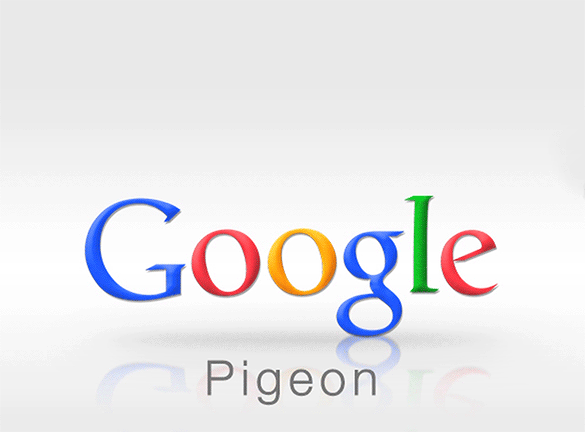 Last week the online search world experienced an earthquake. The earth didn’t actually move, but our search results experienced a significant “shake” when Google released what has been dubbed the “Pigeon” update. For local businesses, this update has been extremely positive, displaying business listings in a huge percentage of its queries. We have discovered that small businesses, locally searched, may actually see a big gain as a result of the Pigeon update. Let me explain some of our findings. Initially, many who reviewed results after the update concluded that local Map Packs were significantly reduced in Google search results. The initial data that MOZ released suggested a grim picture with a huge reduction in Map Packs. However, upon further inspection, the queries performed lacked user location. For years Google has detected user’s physical location and used that information to deliver unique search results. Now it appears that setting location is necessary to return the most relevant local results. Continue reading
Last week the online search world experienced an earthquake. The earth didn’t actually move, but our search results experienced a significant “shake” when Google released what has been dubbed the “Pigeon” update. For local businesses, this update has been extremely positive, displaying business listings in a huge percentage of its queries. We have discovered that small businesses, locally searched, may actually see a big gain as a result of the Pigeon update. Let me explain some of our findings. Initially, many who reviewed results after the update concluded that local Map Packs were significantly reduced in Google search results. The initial data that MOZ released suggested a grim picture with a huge reduction in Map Packs. However, upon further inspection, the queries performed lacked user location. For years Google has detected user’s physical location and used that information to deliver unique search results. Now it appears that setting location is necessary to return the most relevant local results. Continue reading
All posts by drodecker
Phone Numbers No Longer Allowed in Google Ads
Google announced a policy change to no longer allow advertisers to publish their phone number in ads. It’s a surprising move that may have significant repercussions.

RIP: Example Ad unit of phone number in ads
Google has quietly published this in their Advertising Policies change log as well as notifying partners and customers through webinars. Advertisers wanting to engage users with a direct phone number by using call extension.
According to the policy log, Google is making the change to: “foster a safer, more consistent user experience across desktop, tablet, and mobile devices” in an effort to make ads more relevant, accurate & clear to users.
At first my reaction was a bit of shock and sadness for local businesses. For years advertisers have taken advantage of the ad unit space by inserting their phone number in the ad text. One idea being that you can get a direct phone call, instead of being charged for a click. A second being the importance of a phone lead to a local business. Driving a visitor to a conversion optimized landing page is great for lead generation or direct conversions, but most small business still live and die by the phone. Without the ability to get a phone call directly form an add demanding any extra clicks, they will be the ones most impacted. Particularly since PPC advertising has been a good way to get yourself noticed if you have a business in a particularly competitive vertical.

Call Extensions: Phone number linked to Google Places listing.
This also creates a barrier for non-local advertisers (i.e. a nation wide ad), since businesses with a Google Places listing will still be able to display their phone number directly in a SERP. It may also present a challenge for marketers that publish a call tracking phone number in their ad to measure return. With call extensions however, it is still possible (with a little work) to use your own call tracking phone number. Google provides its own call tracking (aka forwarding) number for an extra cost of $1 for legacy campaigns. Nevertheless, this hurdle will probably result in many more local phone numbers and less toll-free numbers shown in Google Ads.
So it is reasonable to consider that this change is a win for local businesses and users alike. For now, we will be busy changing ad copy for thousands of local business ads. According to the Google, starting April, Ads will be disapproved if they contain a phone number.
Mobile VS Desktop Search Differences
 Local Splash Founder and CTO, David Rodecker, and other members of the Local Splash team have been researching the difference between desktop and mobile SERPs.
Local Splash Founder and CTO, David Rodecker, and other members of the Local Splash team have been researching the difference between desktop and mobile SERPs.
An early piece of this research shows that there is a difference between a search performed on a mobile device and a desktop computer even in the exact same location, signed into the exact same Google account and searching the exact same query. Here is the desktop version:

This is a fairly standard SERP with 3 organic results displaying before location results and surprisingly no Google Ads paid search results at the top. Now look at the difference between this page and the mobile page:

There are several interesting differences between the results:
1. There are less organic search results before the location results on the mobile search. This is probably the least surprising difference. Google has been saying, for several months now, that 50% of searches have local intent so it comes as no surprise that mobile SERP’s cater to this switch in the way people search.
2. There is a significant difference in locations showing up between the two results. Both letter “A” results in mobile and desktop are Taco Bell, however they are different locations (the addresses are different). Not only that, but other than the first two, the entire pack of location result is different, which means that 6 out of 7 physical addresses are different between desktop and mobile search.
3. There is significant local mobile advertising, as shown in the lack of Google Ads ads on the desktop search compared to the two ads displayed in the mobile SERP. I think this may be the most fascinating thing in the search comparison. Even though the deceleration of desktop search and increase in mobile search and mobile ad revenues is one of Google’s worst kept secrets there is nothing like actually viewing it in the wild.
These factors seem to point to a localization of the results for mobile devices that takes us one step beyond desktop results.
Whether it’s mobile or desktop results, one thing is clear: local results are dominating the results page, which means it’s more important now than ever for businesses to focus on their local SEO strategies.
What local search queries are you noticing dramatic differences in for mobile and desktop?

